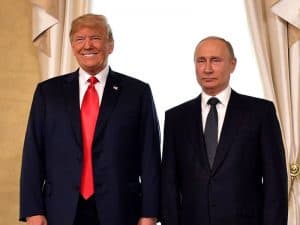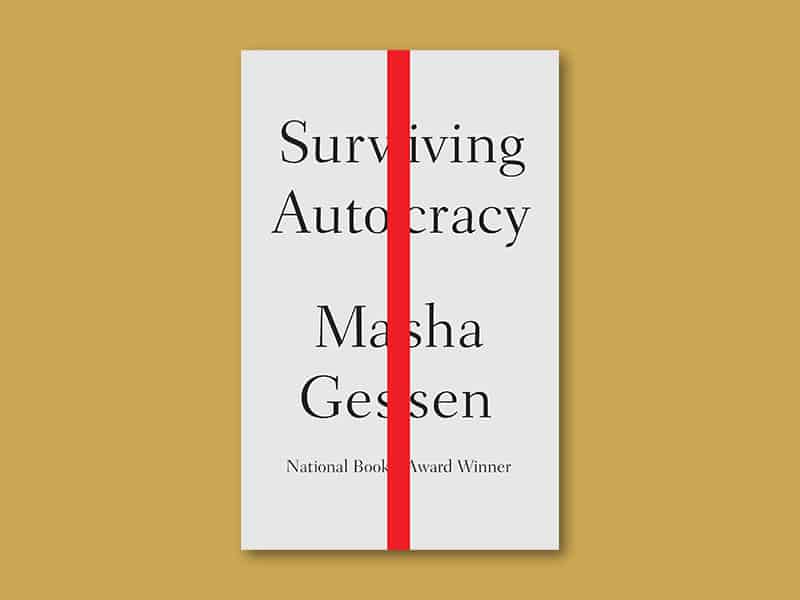Enough books have been published about the D.J. Trump Crime Family to fill a studio apartment. Ace investigative reporters Wayne Barrett and David Cay Johnston have written extensively about The Donald’s formative sleazy/unseemly years in the big-money real estate rackets. New Yorker journalist Mark Singer wrote the most entertaining piss-take on the world’s most inarticulate narcissist. Various mainstream journalists have charted the deranged trajectory of Trump’s time in the White House; former associates, administration officials, and a person who was willing to admit she had sex with Trump have also produced volumes that were deemed publishable.
I haven’t read them all (nor would I want to) but I feel safe in saying that Masha Gessen’s latest book, Surviving Autocracy (Riverhead), is likely the best of the bunch. It is certainly the most timely entry in the Trump Studies slag pile, as it provides sharp new insights and cuts through half-baked received wisdom while also making a compelling case that voting out Trump and overcoming Trumpism should be forefront in the minds of anyone who wants a livable future in our teetering republic.
Gessen is a queer Russian journalist who fled Putin’s crackdown on LGBT parents a year after “their” (Gessen prefers they/them pronouns) book The Man Without a Face: The Unlikely Rise of Vladimir Putin was published in 2012.. Though Gessen has written on a wide variety of topics, their articles for The New York Review of Books and The New Yorker in recent years have mostly focused on either Trump or Putin. Given the author’s years of in-depth reading and reporting in both Russia and the United States, Gessen is in an especially good position to compare and contrast the two kleptocrats.

Gessen sees the mainstream media’s obsessive coverage of Robert Mueller’s investigation of collusion between the Trump campaign and the Kremlin as a counter-productive, all-consuming pursuit that overshadowed other equally blatant offenses perpetrated by Team Trump, such as trashing the Environmental Protection Agency for the benefit of corporate polluters, Trump family profiteering off the presidency in violation of the Emoluments Clause of the U.S. Constitution, encouragement of hate crimes against people of color, and the blatant packing of courts with underqualified right-wing ideologues, to name a few. And while Trump has a hard time containing his man crush on Putin, Gessen points out that he also greatly admires other thuggish heads of state, including Recep Tayyip Erdoğan of Turkey and Rodrigo Duterte of the Philippines; Trump even said that when he met with North Korean dictator Kim Jong-un, “we fell in love.”
Alhough Gessen acknowledges that there was a covert Russian operation to influence the 2016 U.S. presidential election, they feel that a “xenophobic conspiracy theory” painting Trump as simply a Russian puppet did little to help fight Trumpism. Gessen also finds it problematic that many liberals deified Robert Mueller, who had been FBI director during a period when the Bureau engaged in torture of detainees, as documented by the American Civil Liberties Union. And ultimately the hoped-for deliverance from Trumpism did not arrive; though in effect Mueller called upon Congress to continue the investigation, Attorney General William Barr acted as his boss’ fixer and made sure that didn’t happen.
Gessen argues that liberal media personalities, such as Rachel Maddow, who paint Putin as a brilliant puppet master overlook that the Russian president is, like his number one American fan, a man of limited intelligence with minimal intellectual curiosity. Gessen observes, “Terrifying as it is to contemplate the catastrophes of the twentieth century, it would be even more frightening to imagine that humanity had stumbled unthinkingly into its darker moments. But a reading of contemporaneous accounts will show that both Hitler and Stalin struck many of their countrymen as men of limited ability, education, and imagination—and, indeed, as being incompetent in government and military leadership. Contrary to popular wisdom, they were not political savants, possessed of extraordinary talent that brought them to power. It was, rather, the blunt instrument of reassuring ignorance that propelled their rise in a frighteningly complex world.”
The ignoramus factor obviously looms large in the Trump administration. Betsy DeVos knows virtually nothing about education aside from how to suck profits out of schools; Ben Carson, like many Trump appointees, had zero experience in public office before becoming head of Housing and Urban Development; the now-departed Rick Perry didn’t realize that his job as Department of Energy secretary would involve managing nuclear weapons. Gessen also reminds us that “Trump’s cabinet—the wealthiest in history—produced more allegations of conflict of interest than an army of journalists could track.” Public service and expertise are not exactly core concepts for this bunch.
When it comes to incomprehensible mental processes, though, none of his underlings can compete with The Donald. Gessen writes, “A trademark Trumpian approach to attacking language is to take words and throw them into a pile that means nothing … Trump’s word piles fill public space with static, the way pollutants in an industrial city can saturate the air, making it toxic and creating a state of constant haze.” By now it is obvious to anyone with at least one foot in the real world that lies proliferate as soon as Trump begins speaking. Gessen calls the Orange One’s approach to prevarication “the power lie, or the bully lie. It is the lie of the bigger kid who took your hat and is wearing it—while denying that he took it.”
In the age of COVID-19, Trump’s “power lies” deny scientific reality, downplaying and disparaging concerns about the worsening pandemic. Gessen argues that Trump’s approach to the virus fits perfectly into his wheelhouse: blaming foreigners and stoking xenophobic paranoia about open borders. As is always the case with Trump, empathy is an unheard-of concept amidst his scattershot fabrications. Because of his unwillingness and inability to enable competent management of resources that would have stressed cooperation between federal and state governments, Trump’s smoke-and-mirrors lie factory made a bad situation worse. In Gessen’s words: “Three years of Trumpism had extinguished whatever remained in American politics of the language of solidarity or the idea of public welfare.”
In attempting to understand how Trump and his backers seized and then consolidated power, Gessen consulted the work of Hungarian sociologist Bálint Magyar, a writer on autocracy who spent years looking at the post-1989 history of his homeland and coined the term “mafia state.” Such a state is ruled by one all-powerful man who dispenses graft and power to his underlings like an organized crime lord. Trump’s formative experiences working with notorious mob lawyer Roy Cohn gave him an early start on filling such a role.
Magyar’s model also deals with the corruption of language. In Trump-era America, alternative reality-speak’s damage to standard discourse has left mainstream media and conventional politicians unable to adapt to the far-right’s propaganda machine. Bending over backward to be fair, stalwarts of the status quo wind up giving credence to outrageous lies. Regarding leading newspapers such as The New York Times and The Washington Post, Gessen writes, “the tone of neutrality, authority, and restraint that legacy publications adopt has a way of shifting the journalist away from the public and toward the person in power, making them act more like go-betweens than representatives of one side and one side only. That makes the media ill-equipped to resist the autocrat’s project of coming to dominate the communications sphere.”
Gessen doesn’t shy away from looking at systemic problems that have existed under both Democratic and Republican administrations. Barack Obama continued the “War on Terror” of George W. Bush, increasing extra-judicial executions by drone and overseeing the deportation of more people than any other previous president. Gessen also points out that in the United States, “Elections are decided by money … it is contributions from the private sector that allow campaigns to exist in the first place.” Trump’s deep-pocketed far-right backers were only too happy to help The Donald buy his way into office.
In Gessen’s view, “To reverse Trump’s autocratic attempt, we will have to abandon the idea of returning to an imaginary pre-Trump normalcy when American institutions functioned as they should.” Slick technocrats promising a kinder, gentler corporate status quo are not adequate to the task of true oppositional resistance politics. Instead, Gessen sees hope in the “moral aspiration” of activist legislators such as “The Squad” (left-wing Democrats Alexandra Ocasio-Cortez, Ayanna Presley, Ilhan Omar, and Rashida Tlaib) and the late civil rights heroes John Lewis and Elijah Cummings.
Gessen’s conclusion rings true: “We can only heal by looking forward—perhaps to a life that will be slower, more environmentally responsible and less materially comfortable, but also more clearly rooted in mutual aid and the understanding of our fundamental equality and interdependence.”
Of course, step one is defeating Trump this coming November. That will require everyone to the left of our reality-show president to get off their couches and do whatever they can—phone or text banking; letter or postcard writing; pooling money with friends to support grassroots voting rights groups such as We Got the Vote; or even yelling from a socially-distanced street-corner soapbox.
If every despairing, defeated anti-Trumper takes a break from doom and gloom and engages in what the great World War II-era Italian dissident Antonio Gramsci called “optimism of the will,” we may just prevail. And if we don’t, at least we’ll have gone down fighting, a better option than rolling over and playing dead before the battle is half done.
Reprinted from January Magazine
